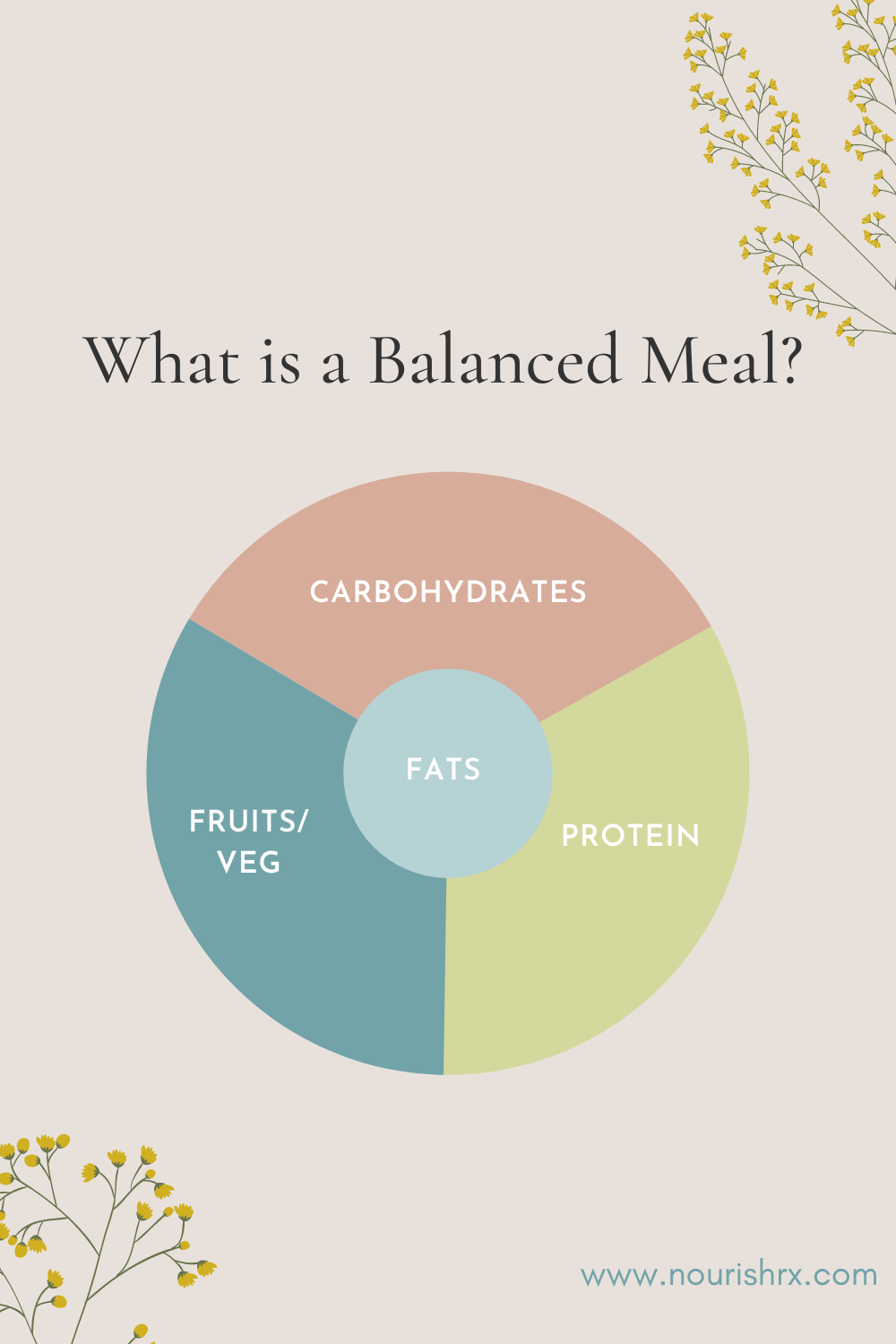
Consuming a balanced meal consists of flexibility and food variety. It incorporates carbohydrates, proteins, fats, fruits and vegetables so that your body is getting fuel throughout the day. Some days may look different than others, depending on foods available, your hunger levels, food preferences, and what sounds satisfying at that time of day.
When trying to adequately nourish yourself throughout the day understanding what makes the most sense for your individual needs can be tricky. Our team has the unique benefit of offering micronutrient testing to be able to determine a Flexible Meal Plan that makes the most sense for you.
However, even without knowing specific micronutrient deficiencies you may have, we recommend starting with splitting your plate into thirds so that it consists of vegetables/fruit, carbohydrate, protein with a source of fat at every meal. This may or may not also include a dessert or snack food.
Why do we need different food groups in a balanced meal?
Carbohydrates
Our bodies run off of carbohydrates for energy and brain power. Carbohydrates are the main source of fuel for muscles and the only source of energy for the brain. Whole grains also provide antioxidants and fiber for digestive health, satiety, and cardiovascular health. Carbohydrates contain B vitamins to help the body with energy metabolism, and iron to deliver oxygen throughout the body.
Inadequate carbohydrate intake when trying to curate a balanced plate can cause fatigue and tiredness, depression, anxiety, and constipation.
protein
Protein is extremely beneficial for muscles, energy, skin, tendons, organs & bones. Every cell in the body depends on protein. Protein serves for much more than building muscle, including blood clotting, immune function, and tissue repair. Meat sources of protein are particularly rich in iron, which carries oxygen through the blood and vitamin B12, which is essential for energy metabolism.
When building a balanced plate, inadequate protein intake can cause muscle wasting, low metabolism, reduced energy, and electrolyte imbalances.
Fats
Fats are important for long lasting energy and satiety: Eating fat is essential for optimal health and very low fad diets cause major health risks. Fat not only provides long lasting energy, but it also insulates organs and maintains body temperature. Fat forms the protective membrane around all cells of the body, and fatty acids are converted into essential hormones such as vitamin D and allow for absorption of many other vitamins. Certain kinds of fats, omega-3s, can even act as anti-inflammatories and reduce risk of heart disease.
Inadequate fat intake on a balanced plate can cause reproductive failure, fatigue, poor healing and liver and kidney disorders.
fruits and vegetables
When thinking about creating a balanced plate, fruits and vegetables for needed optimal health. Packed in antioxidants, phytonutrients, vitamins, minerals and fiber, fruits and vegetables are nutritional powerhouses. They help prevent disease and increase our immune systems to fight off metabolic stress.
Inadequate fiber intake can cause a weakened immune system, risk of disease, and eye and skin disorders.
dairy
Dairy is an essential part of a balanced plate to help build strong bones: Dairy products are rich in bioavailable calcium to build strong bones.
Inadequate dairy can reduce calcium intake which can cause osteoporosis, a disease in which bones become porous and break easily.
some key components to keep in mind when building a balanced plate
- You might need more or less food depending on your individual needs. Follow your hunger and fullness to help determine how often and how much to eat. If you are in treatment or recovery from an eating disorder, you might still be in the process of restoring your hunger and fullness cues and benefit from structured times for meals and snacks. Working one-on-one with a registered dietitian will help you understand how you can best fuel your unique body.
- Snacks serve as a mini meal when meals are far apart. We usually recommend trying to eat about every 3 hours and for most people this will mean 2-3 snacks a day. A balanced snack will typically include 2-3 food groups.
- In addition to meeting your physical needs, aim to create meals that are satisfying. Ask questions like “What do I feel like eating?”, “What sounds good?”, “How can I make this plate tasty, inviting, attractive?”
If you are curious about what a balanced intake might look and feel like for you - contact us today or take a step towards understanding your body's needs more closely with our amazing nutrition testing and Flexible Meal Planning Options.
Comments Off on What is a Balanced Meal?